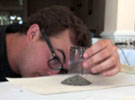Students and faculty used winter break 2012-13
to conduct research and performed community service
SMU students and faculty used winter break to conduct research and perform community service.

During winter break, students and faculty have conducted research and performed community service in the United States and abroad. They blogged about their experiences on SMU Adventures. Their trips include:
During J Term 2013, nine students traveled to Jamaica as part of a multidisciplinary Earth Sciences course to conduct geophysical research on earthquake risks. During their trip, the students collected and analyzed geophysical data on land and at sea, and presented their results to Jamaica’s Office of Disaster Preparedness and Emergency Management.
Taught by SMU Earth Sciences Associate Professor Matt Hornbach and Lyndon Brown of the University of the West Indies, the course is funded in part by the Society of Exploration Geophysicists’ Geoscientists Without Borders program and The Institute for the Study of Earth and Man in SMU’s Dedman College of Humanities and Sciences.
“It was a great feeling knowing that by the end of the day, we would have enough data collected to begin piecing together the puzzle of how Earth’s tectonic forces shaped the area and how they might continue to shape the landscape of Jamaica for years to come,” wrote Earth Sciences graduate student Cliff Mauroner.
Eight SMU students, led by Perkins School of Theology Professor Harold J. Recinos and Embrey Human Rights Program Coordinator Sherry Aikman, traveled to El Salvador in January. The group studied human rights atrocities that have occurred in the Central American country during the last 40 years, including the assassination of Archbishop Oscar Romero and the Zona Rosa guerrilla attack.
“Today is the day that we visited the site of El Mozote, where in December of 1981, around 1,000 men, women, and children of the village were massacred by the Atlacatl Battalion army in the span of three days,” wrote Emily Mankowski, a junior majoring in human rights and political science. “I have not been able to comprehend how someone would be able to take the lives of innocent people, nor do I think I will ever understand. One thing that I do know is that the memory of those who died must live on.”
Eighteen professors, academic professionals, students and community members from SMU, Dallas and across Texas traveled through Poland in December to study the Holocaust. Led by SMU Embrey Human Rights Program Director Rick Halperin, the group visited cities and death camps where, during World War II, some 4,375,000 people were murdered during the country’s Nazi, Germany, occupation.
“At each Holocaust memorial site, one of us lights a candle on behalf of everyone in our group,” wrote Denise Gee, of SMU News and Communications. “Afterward, one of several Jewish friends traveling with us reads aloud from the Kaddish prayer of mourning as we bow our heads. … Our guides are especially appreciative. Some tell us that few people other than older adults with direct connections to the Holocaust pay their respects in this way anymore.”
ACE and Alternative Breaks in New Orleans
Ten students and a faculty member traveled to New Orleans in December to rebuild homes damaged by hurricanes. They worked with the organization Youth Rebuilding New Orleans (YRNO). The Dedman College Center for Academic-Community Engagement (ACE) and Office of Community Engagement and Leadership co-sponsored the trip.
“YRNO does a fantastic job of both helping young people become involved with service and rebuilding their community, and with helping teachers/working adults move into homes they may not otherwise be able to afford,” wrote J. Michael Cruz, ACE director. “I feel this has been a great experience working with a group of students I didn’t know before and may never have in class.”
# # #